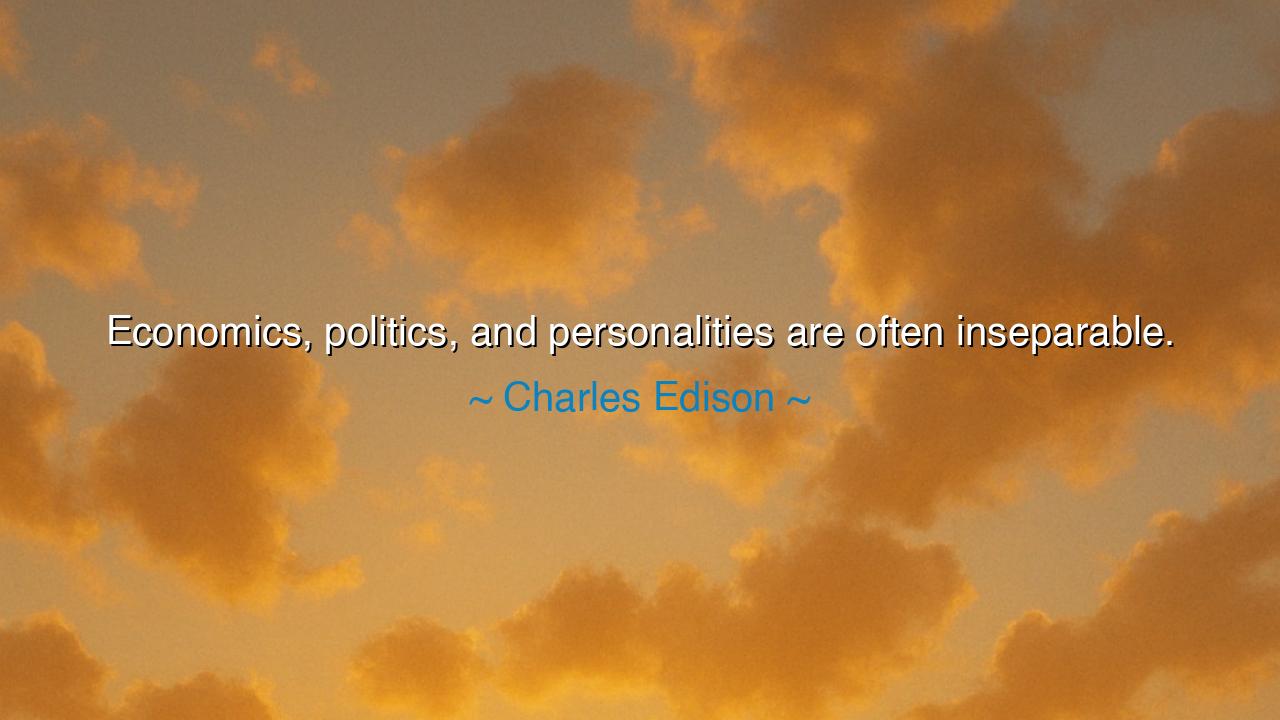
Economics, politics, and personalities are often inseparable.






Hear the words of Charles Edison, son of the great inventor, and himself a man of public service, who declared: “Economics, politics, and personalities are often inseparable.” These words are a torch of wisdom, revealing the hidden cords that bind together the forces that shape nations. They remind us that history is not moved by abstract forces alone, nor by cold numbers, nor by faceless systems. It is moved by the interplay of money, power, and the human spirit, each inseparable from the other, each shaping the destiny of peoples.
The origin of this truth is found in the fabric of every great age. Economics, the lifeblood of resources and wealth, provides the stage upon which struggles are fought. Politics, the struggle for power and direction, dictates who commands and who obeys. Yet neither exists in a vacuum, for both are infused by personalities—the ambitions, weaknesses, and visions of men and women who carry the weight of decisions. Edison’s words remind us that nations rise or fall not only because of markets or systems, but because of the choices of individuals whose spirits shape those systems.
Consider, O listener, the story of Franklin D. Roosevelt during the Great Depression. The collapse of markets had thrown millions into poverty. Economics dictated hardship, hunger, and despair. Politics demanded solutions, but those solutions required not only policy but the will to believe in change. It was Roosevelt’s personality—his calm, his optimism, his “fireside chats”—that transformed despair into hope. Without his presence, the New Deal may have faltered; with it, a nation endured. Here we see the trinity of Edison’s words: money, power, and human character woven into one destiny.
Or look to the fall of the Soviet Union. Economics had stagnated, with shortages and inefficiency crippling the nation. Politics teetered between reform and repression. Yet it was the personality of Mikhail Gorbachev—his willingness to open, to reform, to risk change—that set the course of history. Without him, the empire might have stumbled on in tyranny; with him, the Cold War came to an end. Again, the forces of wealth and power were inseparable from the character of the one who wielded them.
Edison’s words also carry a warning: those who study only economics or politics in isolation will miss the true forces at work. Leaders blinded by numbers alone forget that people are moved by trust, fear, and passion. Likewise, those who worship personalities without considering the structures of power risk being seduced by charm while ignoring corruption. The wise understand that these three forces are a braid—pull one thread, and the others shift; ignore one, and the whole fabric unravels.
O seeker, the lesson is this: when you look upon the world, see not only systems, not only rulers, not only markets. See how they are bound together. Ask not only what policy is proposed, but who proposes it, with what character, and upon what economic ground. Recognize that leaders are tested not in times of ease but in times of crisis, when money falters, politics fractures, and personality decides whether a nation stands or falls.
And what actions must we take? In our own lives, remember that your choices, too, are inseparable from your character. In your work, your family, your community, your economics, your politics, and your personality intertwine. Guard your integrity, for it will shape how you use your resources. Guard your compassion, for it will shape how you wield your influence. Guard your courage, for it will decide whether you rise to lead when others falter.
Thus remember Edison’s teaching: “Economics, politics, and personalities are often inseparable.” Let it be a guide not only for nations but for individuals. For the fate of peoples is not written by one force alone, but by the meeting of resources, power, and the human soul. To master all three with wisdom is to walk the path of true leadership, and to pass down to future generations a legacy of justice, strength, and honor.






HVHoi Vit
Charles Edison’s insight into the interconnection of economics, politics, and personalities really makes me think about how these factors interact in today’s world. It’s often not just about the policies themselves, but about the people implementing them. How do we ensure that these personal dynamics don’t cloud the judgment of those in power? How can we foster more transparency and fairness when personality plays such a large role in shaping decisions?
NHngan ha
Edison’s perspective on the inseparability of economics, politics, and personalities is interesting. It underscores how individual motivations and political maneuvering often shape economic decisions. Can we ever fully separate the economic from the political in a democracy? Is there a way to ensure that the economic policies put in place are more about the common good than the personal agendas of those in charge?
AAn
This statement rings true, especially when looking at modern politics. Many times, the economics of a nation are influenced by the personal beliefs and ambitions of political leaders. How can we navigate a system where economics and politics are so heavily influenced by personalities? Should we focus more on systems that limit personal influence or on cultivating leaders with a more public-minded approach?
MFMin Fu
Edison’s quote suggests that personal relationships and individual characters play a role in the functioning of both economics and politics. It makes me wonder: to what extent can a country’s economic direction be influenced by the personalities of those in power? Is it possible to have an objective, rational economic policy, or are leaders’ personal convictions always going to influence the decisions they make?
DCDlong Chan
This quote highlights a reality that many people overlook—the personal dynamics of politicians and leaders are deeply intertwined with economic and political decisions. How much do personal biases and ambitions really shape the economic policies we see today? In the end, can any economic policy be entirely objective, or are the personalities of those in power always a factor?